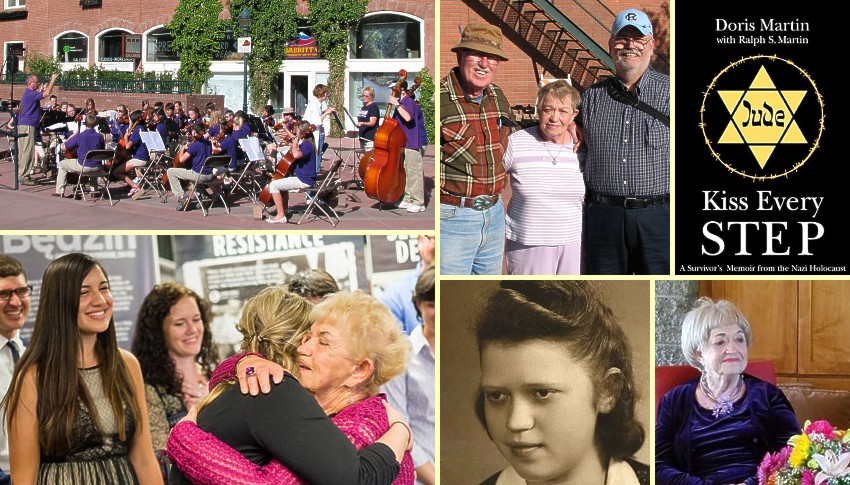Kansas Snapshots by Gloria Freeland - September 2, 2022
A chance encounter
This is a story of a chance encounter from the summer of 2010. It is both a happy tale and a sad one.
The Gold Orchestra, a well-respected local youth orchestra, had been formed some 20 years earlier by Dr. David Littrell, a cello
teacher and conductor of the Kansas State University orchestra. Daughter Katie was a violinist.
Littrell understood that most of his young charges weren't going to make music a career. But he felt strongly that the discipline
developed while learning to play an instrument with others would serve them well as they matured. He was also a believer not just
in working hard, but playing hard too. So at the end of the year, he typically arranged a trip for the orchestra, such as
traveling to the Rocky Mountains. The youngsters would play concerts and then spend time visiting sites, hiking, rafting and
doing other fun things.
In 2010, the trip included a visit to the Grand Canyon. With Littrell's blessing, husband Art and I tagged along as neither of us
had ever been there. The plan was to drive our own vehicle, while Katie traveled with the orchestra on the bus.
Though she enjoyed the violin, her interest had been shifting toward vocal music. Not long before the trip, she was invited to a
vocal workshop she very much wanted to attend. Katie chose the workshop, which was scheduled at the same time as the Grand Canyon
trip. Rather than a refund, we suggested Littrell offer her slot to any orchestra member who would have liked to go, but couldn't
afford it.
The previous year we had visited Auschwitz, Poland, the site of perhaps the most infamous of the World War II German concentration
camps. That visit would play an important part in our travel with the Gold Orchestra.
We joined the group at their first stop in Albuquerque. Littrell always did a remarkable job with the youngsters, and the
performance in a church that evening was quite enjoyable.
But the stop at Flagstaff is the one germane to this story. The venue proved to be a bit of a challenge. It was outdoors with the
musicians facing the late afternoon sun. A gusty wind made the sheet music difficult to manage. A graduate school friend of
Littrell, a fellow cello player, lived nearby. She came to listen and we spent some time talking with her.
When the performance was over and the youngsters were packing their instruments, a couple appeared near where the musicians had
been seated. They looked slightly bewildered and we walked over to see if we could help. It seems they had heard about the concert,
but had the time wrong.
During the conversation, Art noted the woman wasn't a native English speaker and asked where she was from. She said that while
she and her husband split their time between Flagstaff and a home in California, she was originally from Poland.
Art mentioned our trip the previous year and asked where in Poland she was from. We were a bit startled when she said, "a small
village near Katowice." Art then surprised her by knowing where it was as we had stopped at its outskirts to refuel.
She asked why we had visited Poland and when we explained, it was again our turn to be surprised by her answer. She was Jewish and
had been interred at the camp - a place where 1.3 million people were put to death. But she had been fortunate. Being young and
energetic, she was selected to work at the Ludwigsdorf sub-camp, where she spent her time making land mines.
I no longer recall the details of how the conversation progressed, but we were startled again when we learned that all seven members
of her Szpringer family survived. Art commented that he had never heard of such a thing and she said she hadn't either.
Her name was now Doris Martin and she was with her second husband Ralph, her first husband having died many years earlier. Asking
what had brought them there, we learned that Doris had written "Kiss Every Step" - a book about her family's Holocaust experience.
The book had been released a couple of months before, and she was in town for a book signing at a local bookstore. With a bit of a
twinkle in her eye, she remarked that they had left a number of signed copies at the store and if we wanted one, we should drop by.
We spoke a bit longer while the orchestra members completed collecting their belongings. Later, we did stop by the store and I
bought a copy of Doris' book.
Many have speculated that the Szpringer family may be unique - that it may have been the only one to survive without losing a
single member. Doris, both in our brief exchange and in interviews I have read, frequently mentioned how lucky they were. But
from the book, it was clear they did what they could to survive. For example: since they spoke Yiddish at home, they spoke Polish
with an accent and immediately stood out from native speakers. While instinct would say to flee from your persecutors, two of Doris�
brothers went to Germany. They reasoned that Germans wouldn't be fluent in Polish and so wouldn't recognize they spoke it with an
accent.
Considering the subject matter, the book is easy to read. Of course, knowing at the beginning that all the family members survive
helps.
In 2000, Ralph and Doris founded The Martin-Springer Institute in Flagstaff to "raise awareness of human rights through Holocaust
remembrance and education." She was a much-sought-after speaker and after meeting her, I understand why.
These events again came to mind now because we just learned of Doris' death on August 3 of this year. She was 95. Husband Ralph
survives.
